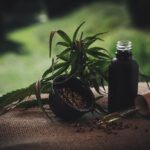Cannabidiol (CBD) has gained immense popularity in recent years as an all-natural remedy for various health concerns. From pain relief to anxiety reduction, CBD’s potential benefits have sparked curiosity and interest among consumers worldwide.
In this comprehensive guide, we will explore CBD’s common uses, the scientific evidence supporting its benefits, its safety and potential side effects, how to use it, find the right dosage, and its legal status in the USA and around the world.
Over the past few years, CBD has witnessed exponential growth in popularity due to its potential health benefits and non-intoxicating nature [1]. CBD products are now widely available in various forms, such as oils, tinctures, edibles, topicals, and vapes, making it accessible to a broad range of consumers. As more people turn to natural remedies for their health concerns, CBD has emerged as a popular alternative to traditional pharmaceuticals.
While research on CBD is still in its infancy, numerous studies have shown promising results regarding its potential health benefits. For instance, CBD has been found to have analgesic and anti-inflammatory properties, which can help alleviate pain and inflammation [2]. Additionally, studies suggest that CBD may help reduce anxiety by interacting with serotonin receptors in the brain [3]. CBD has also shown potential in improving sleep quality by reducing anxiety and pain that can interfere with restful sleep [4]. Furthermore, research indicates that CBD can help reduce acne by regulating sebum production and exhibiting anti-inflammatory effects [5]. Lastly, CBD has been shown to have potential as a treatment for epilepsy and other neurological disorders due to its neuroprotective properties [6].
CBD is generally considered safe and well-tolerated by most people [7]. However, it can cause some side effects, particularly at high doses. Common side effects may include drowsiness, dry mouth, diarrhea, and changes in appetite or weight [7]. It is crucial to consult with a healthcare professional before using CBD, especially if you are pregnant, nursing, or taking medications, as CBD can interact with certain drugs [8].
CBD can be consumed in various forms, such as oils, tinctures, edibles, topicals, and vapes. The method of consumption will depend on your preferences and the specific health concern you are addressing. For example, oils and tinctures can be taken sublingually, edibles can be consumed orally, topicals can be applied to the skin, and vapes can be inhaled. It is essential to start with a low dose and gradually increase it until you find the optimal dosage for your needs [9].
Determining the right CBD dosage can be challenging, as it depends on factors like individual body chemistry, the severity of the condition being treated, and
the concentration of CBD in the product [9]. It is generally recommended to start with a low dose and gradually increase it until you find the optimal dosage for your needs. It may take some trial and error to find the right dosage, so it’s important to be patient and consistent with your regimen. Consulting with a healthcare professional experienced in CBD can also be helpful in determining the appropriate dosage.
The legal status of CBD varies depending on the country and, in the case of the United States, the specific state. In the USA, the 2018 Farm Bill legalized the production and sale of hemp-derived CBD products containing less than 0.3% THC on a federal level [10]. However, some states have their own regulations regarding CBD, so it’s essential to check your state’s laws before purchasing or using CBD products.
Internationally, the legal status of CBD varies significantly. Some countries, like Canada and many European Union member states, have legalized CBD under specific conditions, while others, such as China and Russia, have more restrictive regulations [11]. It’s crucial to research the laws and regulations regarding CBD in the country where you reside or plan to travel before purchasing or using CBD products.
CBD has emerged as a popular natural remedy for various health concerns, with scientific evidence supporting its potential benefits in areas such as pain relief, anxiety reduction, and sleep improvement. While generally considered safe, it’s essential to be aware of potential side effects and consult with a healthcare professional before using CBD, especially if you are pregnant, nursing, or taking medications. Understanding the different methods of consumption, finding the right dosage, and staying informed about the legal status of CBD in your region are crucial steps in making informed decisions about incorporating CBD into your wellness routine.
Project CBD: A non-profit organization dedicated to promoting and publicizing research on CBD and other components of the cannabis plant. Their website offers numerous articles, guides, and research summaries. https://www.projectcbd.org/
Does CBD help with nausea? Yes, CBD (cannabidiol) can help with nausea. CBD is a non-psychoactive compound found in the cannabis plant that has been shown to have several therapeutic effects. It interacts with the body’s endocannabinoid system and can influence the serotonin (5-HT1A) receptor, which plays a role in regulating nausea and vomiting. By modulating this receptor, CBD can potentially help alleviate nausea and provide relief for people experiencing this symptom. However, individual responses to CBD may vary, and it’s essential to consult a healthcare professional before using CBD for nausea.
Does CBD Help You Sleep? Yes, CBD may help you sleep. It has been found to have a variety of potential therapeutic effects, including promoting relaxation and reducing anxiety. These effects can contribute to better sleep quality for some individuals.
CBD interacts with the body’s endocannabinoid system, which is involved in regulating various bodily functions, including sleep. By influencing this system, CBD may help to stabilize sleep patterns and improve overall sleep quality.
Moreover, CBD’s anxiolytic properties can help reduce anxiety and stress, which are common factors that can interfere with sleep. By alleviating anxiety, CBD may help individuals fall asleep more easily and stay asleep throughout the night.
However, it’s important to note that individual responses to CBD may vary, and its effectiveness in improving sleep can depend on factors such as dosage and the underlying cause of sleep issues.
Does CBD Make You Tired? CBD generally does not make you tired, as it is a non-psychoactive compound found in the cannabis plant. Unlike THC (tetrahydrocannabinol), which is responsible for the “high” feeling and can cause drowsiness, CBD does not have intoxicating effects.
However, CBD can promote relaxation and help reduce anxiety, which may indirectly contribute to feelings of calm and relaxation that could be mistaken for tiredness. Some users report that CBD helps them feel more at ease and sleep better, but this does not necessarily mean it makes them feel drowsy or tired during the day.
Individual responses to CBD can vary, and factors like dosage, method of consumption, and personal body chemistry may influence how CBD affects you. If you are concerned about the potential for CBD to make you feel tired, it’s best to start with a low dose and monitor your reaction before increasing the dosage or frequency.
Does CBD Makes You Hungry? CBD (cannabidiol) typically does not make you hungry or cause an increase in appetite. This is because CBD is a non-psychoactive compound found in the cannabis plant, unlike THC (tetrahydrocannabinol), which is responsible for the “high” feeling and the well-known “munchies” or increased appetite associated with cannabis use.
Some studies have suggested that CBD may even have an opposite effect on appetite, possibly acting as an appetite suppressant by interacting with the body’s endocannabinoid system. However, more research is needed to fully understand CBD’s effect on appetite.
It is important to note that individual responses to CBD can vary, and factors such as dosage, method of consumption, and personal body chemistry may influence how it affects your appetite.
Does CBD show on DOT drug screen? No, CBD does not show up on a Department of Transportation (DOT) drug screen. The DOT drug test primarily screens for THC, the psychoactive compound in marijuana. Since CBD is non-psychoactive and not a substance of concern for the DOT, it is not included in the testing panel. However, it is crucial to ensure that the CBD product you are using contains no THC or only trace amounts below the legal limit (0.3% THC) to avoid a positive test result. Additionally, be aware that low-quality CBD products may have inaccurate labeling and contain higher THC levels than advertised.
How Does CBD Make You Feel? CBD can make you feel relaxed, calm, and promote a sense of overall well-being for some users. It has been shown to help reduce anxiety, stress, and inflammation, which can contribute to a more balanced and positive mood. However, it is important to note that CBD does not produce a “high” or intoxicating effect like THC, the psychoactive compound found in marijuana.
Individual responses to CBD can vary, and factors such as dosage, method of consumption, and personal body chemistry may influence how it affects you. Some users might experience more noticeable effects, while others might feel only subtle changes. It’s essential to start with a low dose and adjust gradually to find the optimal dosage for your needs.
Is Hemp The Same As CBD? No, hemp and CBD are not the same, but they are closely related. Hemp refers to the non-psychoactive varieties of the Cannabis sativa plant, which contains less than 0.3% THC. Hemp is used for various purposes, including producing fiber, seeds, and oils.
CBD, on the other hand, is a chemical compound found in both hemp and marijuana varieties of the cannabis plant. CBD is one of over a hundred cannabinoids present in cannabis and is known for its potential therapeutic effects.
In summary, hemp is a type of cannabis plant, while CBD is one of the many chemical compounds found within the plant. CBD can be extracted from hemp and is often used in various health and wellness products due to its potential benefits.
What Does Cbd Mean? CBD stands for cannabidiol, which is a naturally occurring compound found in cannabis plants, including hemp and marijuana.
What Is CBD Gummies? CBD gummies are edible products infused with cannabidiol (CBD), a non-psychoactive compound found in cannabis plants. These gummies are a popular choice for those who want to consume CBD without smoking or vaping, as they offer a convenient, discreet, and often tasty method of ingestion.
CBD gummies come in various shapes, flavors, and concentrations, making it easy for consumers to choose a product that suits their preferences and desired dosage. People use CBD gummies for a variety of reasons, such as reducing anxiety, managing pain, or improving sleep quality. However, it’s important to remember that research on CBD’s effectiveness and long-term safety is still ongoing, and individual results may vary. When purchasing CBD gummies, look for reputable brands that provide third-party lab test results to ensure product quality and accurate CBD content.
What Is CBG Vs CBD? CBG and CBD are both cannabinoids found in cannabis plants, including hemp and marijuana. While they share some similarities, they also have distinct properties and potential therapeutic effects.
CBG (cannabigerol) is often referred to as the “mother cannabinoid” or the “stem cell” of cannabinoids. This is because CBG is the precursor to other cannabinoids, including CBD (cannabidiol), THC (tetrahydrocannabinol), and CBC (cannabichromene). In the cannabis plant, CBG-A (the acidic form of CBG) undergoes enzymatic reactions to transform into the various cannabinoids.
CBG is typically found in low concentrations in cannabis plants, making it less abundant than CBD or THC. However, interest in CBG has been increasing due to its potential therapeutic benefits. Early research suggests that CBG may have anti-inflammatory, antimicrobial, and neuroprotective properties. Some studies also indicate that it may help regulate mood, appetite, and sleep.
CBD, on the other hand, is a more well-known and abundant cannabinoid. It is non-psychoactive and has gained popularity for its potential to alleviate anxiety, reduce pain, and improve sleep quality. CBD interacts with the body’s endocannabinoid system (ECS) to help maintain homeostasis or balance.
In summary, while both CBG and CBD are cannabinoids with potential therapeutic effects, they have different properties and roles in the cannabis plant. CBG is less abundant and serves as a precursor to other cannabinoids, while CBD is more well-studied and widely used for its potential health benefits. Research on both cannabinoids is ongoing, and more studies are needed to fully understand their effects and possible medical applications.
What Is The Difference Between THC And CBD? THC and CBD are both naturally occurring cannabinoids found in cannabis plants, but they have different properties and effects on the body.
Psychoactivity: The primary difference between THC (tetrahydrocannabinol) and CBD (cannabidiol) is their psychoactive effects. THC is the main psychoactive component of cannabis and is responsible for the “high” associated with marijuana use. In contrast, CBD is non-psychoactive, meaning it does not cause a high or alter one’s state of mind.
Chemical structure: Although THC and CBD have the same molecular formula (C21H30O2), they have different atomic arrangements. This difference in molecular structure is responsible for their varying effects on the human body.
Interaction with the endocannabinoid system (ECS): Both THC and CBD interact with the ECS, a complex cell-signaling system that plays a role in regulating various physiological processes, including pain, mood, sleep, and immune function. However, they interact differently with the system’s receptors. THC primarily binds to CB1 receptors, which are mainly found in the brain, causing psychoactive effects. CBD, on the other hand, has a low affinity for CB1 receptors and can even counteract some of THC’s psychoactive effects by inhibiting its binding to the receptors.
Potential therapeutic effects: While both THC and CBD have potential therapeutic benefits, their applications vary. THC is often used for its pain-relieving, anti-nausea, and appetite-stimulating properties, while CBD has gained attention for its potential to reduce anxiety, inflammation, pain, and improve sleep quality, among other benefits.
Legality: The legal status of THC and CBD differs depending on the country or region. In the United States, THC is still federally illegal, although some states have legalized its medical and recreational use. CBD derived from hemp (with less than 0.3% THC) is federally legal in the United States due to the 2018 Farm Bill. However, CBD derived from marijuana or CBD products with higher THC concentrations may have restrictions depending on state laws.
Can You Smoke CBD? Yes, you can smoke CBD, but it’s essential to note that smoking anything, including CBD, comes with potential health risks. Smoking CBD involves inhaling vapors or smoke produced by heating CBD flowers or extracts, such as CBD oil or CBD concentrates, in a joint, pipe, or vaporizer.
While smoking CBD may provide quick and effective results, it’s important to consider the potential health risks associated with smoking. Smoking can damage the lungs, irritate the throat, and increase the risk of respiratory infections. Additionally, smoking CBD may not be the most efficient method of consumption, as some of the CBD may be lost through combustion or exhaled before being absorbed.
Alternative methods of consuming CBD, such as edibles, tinctures, and topicals, may be a safer and more effective option for some individuals. It’s essential to consult with a healthcare professional before using any CBD products, especially if you have underlying health conditions or are taking medications.
Can You Take Too Much CBD? While CBD is generally considered safe, it’s still possible to take too much CBD, resulting in unwanted side effects. However, the exact amount of CBD that constitutes “too much” varies depending on individual factors such as body weight, tolerance, and metabolism, among others.
Some of the potential side effects of taking too much CBD include:
Dry mouth
Dizziness or lightheadedness
Drowsiness or fatigue
Diarrhea or digestive issues
Changes in appetite or weight
Changes in mood or anxiety levels
CBD is generally well-tolerated, and the side effects are typically mild and temporary. However, it’s essential to start with a low dose of CBD and gradually increase it until you find the right dosage for your needs. It’s also crucial to consult with a healthcare professional before using CBD, especially if you have underlying health conditions or are taking medications that may interact with CBD.
Additionally, it’s essential to purchase CBD products from reputable brands that provide third-party lab test results to ensure product quality and accurate CBD content.
Can You Use CBD While Pregnant? The use of CBD during pregnancy is a controversial topic, and there is currently limited research available on its effects on pregnant individuals and developing fetuses. As a result, it’s generally recommended to avoid using CBD during pregnancy or while breastfeeding.
CBD products may contain other compounds that could potentially cross the placenta and affect the developing fetus. These compounds may alter the function of the endocannabinoid system, which plays a crucial role in fetal development, and may increase the risk of adverse outcomes, such as low birth weight or developmental delays.
While some individuals may use CBD for nausea, anxiety, or pain relief during pregnancy, it’s crucial to consult with a healthcare professional before using any CBD products, especially during pregnancy or while breastfeeding. A healthcare professional can provide guidance on the potential risks and benefits of using CBD and recommend alternative treatment options that are safer for pregnant individuals and their developing fetuses.
Does CBD Help With Pain? CBD has shown potential in reducing pain and inflammation in some individuals. CBD interacts with the body’s endocannabinoid system (ECS), which plays a crucial role in regulating pain perception, mood, and other physiological processes.
Several studies have found that CBD may help alleviate chronic pain associated with conditions such as arthritis, multiple sclerosis, and neuropathic pain. A 2018 review of studies found that CBD may help reduce inflammation and improve pain in patients with chronic pain conditions.
CBD may also have fewer side effects than traditional pain medications, such as opioids, which can be addictive and cause severe side effects. However, more research is needed to fully understand the potential benefits and risks of using CBD for pain management, and individual results may vary.
Does CBD Lower Blood Pressure? CBD has shown potential in reducing pain and inflammation in some individuals. CBD interacts with the body’s endocannabinoid system (ECS), which plays a crucial role in regulating pain perception, mood, and other physiological processes.
Several studies have found that CBD may help alleviate chronic pain associated with conditions such as arthritis, multiple sclerosis, and neuropathic pain. A 2018 review of studies found that CBD may help reduce inflammation and improve pain in patients with chronic pain conditions.
One study found that CBD may be effective in treating pain associated with multiple sclerosis, while another study found that CBD may be effective in reducing pain and improving sleep in individuals with chronic pain conditions.
References:
Boehnke KF, Scott JR, Litinas E, et al. (2019). “Cannabis Use Preferences and Sleep Quality in a Medical Marijuana Program.” J Addict Med, 13(5): 369-374.
Russo EB. (2018). “The Case for the Entourage Effect and Conventional Breeding of Clinical Cannabis: No “Strain,” No Gain.” Front Plant Sci, 9: 1969.
Vučković S, Srebro D, Vujović KS, et al. (2018). “Cannabinoids and Pain: New Insights From Old Molecules.” Front Pharmacol, 9: 1259.
Does CBD Make You Feel Spacey? CBD (cannabidiol) is non-psychoactive, meaning it does not cause the “high” or feelings of euphoria associated with marijuana use. In fact, CBD may counteract some of the psychoactive effects of THC (tetrahydrocannabinol), the primary psychoactive compound in cannabis.
While some individuals may report feeling relaxed or calm after taking CBD, it typically does not cause feelings of spaciness or disorientation. However, individual responses to CBD may vary, and some people may experience side effects such as drowsiness, lightheadedness, or fatigue, especially when taking higher doses.
It’s essential to start with a low dose of CBD and gradually increase it until you find the right dosage for your needs. It’s also important to purchase CBD products from reputable brands that provide third-party lab test results to ensure product quality and accurate CBD content.
How Much CBD Should I Take? Determining the right CBD dosage can depend on several factors, including your body weight, individual tolerance, the severity of symptoms, and the method of consumption. CBD products come in various forms, such as oils, tinctures, capsules, edibles, and topicals, with different concentrations of CBD per serving.
It’s essential to start with a low dose of CBD and gradually increase it until you find the right dosage for your needs. A general rule of thumb is to start with 1-6 mg of CBD per 10 pounds of body weight, and gradually increase the dose by 1-2 mg per day until you reach the desired effect.
It’s also important to consider the type of symptoms you’re trying to treat. For example, anxiety may require a lower dose of CBD than chronic pain. Some people may find relief from a low dose, while others may need higher doses to achieve the same effect.
Can CBD Make You High? No, CBD does not make you high. Unlike THC (tetrahydrocannabinol), the primary psychoactive compound in cannabis, CBD is non-psychoactive, meaning it does not cause the “high” or feelings of euphoria associated with marijuana use.
Can You Take CBD Oil On A Plane? The legality of traveling with CBD (cannabidiol) oil on a plane depends on several factors, including the source of the CBD and the destination state or country’s laws and regulations.
The Transportation Security Administration (TSA) allows passengers to travel with hemp-derived CBD products that contain less than 0.3% THC (tetrahydrocannabinol), the psychoactive compound in cannabis. However, the TSA states that it is the responsibility of the traveler to ensure that the CBD product complies with local laws and regulations.
Some states have more restrictive laws regarding CBD, so it’s essential to research the laws of the destination state or country before traveling with CBD. Additionally, some countries may have strict regulations on the import and export of CBD products, and it may be illegal to carry CBD across borders.
It’s also important to keep the CBD product in its original packaging and bring any documentation, such as a certificate of analysis, that proves the product’s CBD content and legality. It’s recommended to pack the CBD product in your carry-on luggage and not in your checked baggage.
Does CBD Oil Expire? Yes, CBD (cannabidiol) oil can expire over time, like any other product. The shelf life of CBD oil depends on several factors, including the quality of the product, the extraction method, and the storage conditions.
The majority of CBD oils have a shelf life of 1-2 years when stored in a cool, dark place away from heat, light, and moisture. Over time, exposure to air and light can cause the CBD to degrade, reducing its potency and effectiveness.
To extend the shelf life of CBD oil, it’s essential to store it in a cool, dark place, such as a pantry or cabinet, away from direct sunlight, heat, or moisture. Some CBD oils come with a “best before” date on the label, indicating the recommended time frame for using the product.
It’s also important to purchase CBD products from reputable brands that provide third-party lab test results to ensure product quality and accurate CBD content. When in doubt, it’s recommended to replace CBD oil that is past its expiration date or has been stored improperly.
If you notice any unusual changes in the color, consistency, or smell of the CBD oil, it’s best to err on the side of caution and assume that it has expired. It’s recommended to replace CBD oil that is past its expiration date or has been stored improperly, as it may have reduced potency and effectiveness.
Does CBD Oil Help Sexually? There is limited scientific evidence to support the use of CBD (cannabidiol) oil for sexual enhancement or to treat sexual dysfunction. However, CBD may have some potential benefits that could indirectly improve sexual function.
CBD has been shown to have anti-anxiety and stress-reducing effects, which could help alleviate performance anxiety or stress-related sexual dysfunction. CBD may also have pain-relieving and anti-inflammatory effects, which could improve conditions that contribute to sexual dysfunction, such as pelvic pain or inflammation.
Some individuals also report that CBD may increase sexual desire or improve sexual experiences by enhancing sensory perception or reducing inhibitions. However, these effects are anecdotal, and more research is needed to fully understand the potential effects of CBD on sexual function.





